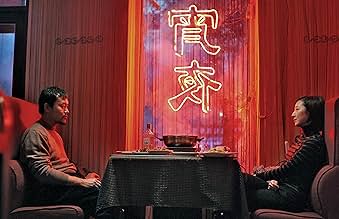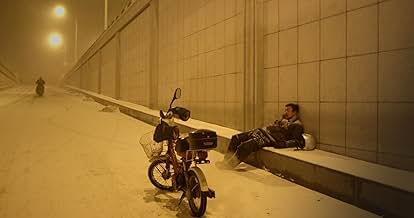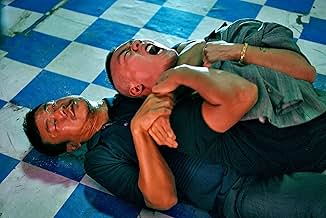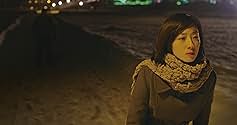IMDb RATING
6.7/10
10K
YOUR RATING
An ex cop and his ex partner decide to follow up on investigation of a series of murders that ended their careers and shamed them, when identical murders begin again.An ex cop and his ex partner decide to follow up on investigation of a series of murders that ended their careers and shamed them, when identical murders begin again.An ex cop and his ex partner decide to follow up on investigation of a series of murders that ended their careers and shamed them, when identical murders begin again.
- Awards
- 28 wins & 46 nominations total
- Director
- Writer
- All cast & crew
- Production, box office & more at IMDbPro
Featured reviews
In snow covered streets surrounded by perpetual darkness detectives and suspects are made distinguishable only by the soft glow of neon signs. Faces are shrouded by shadow, characters motives are unclear. We are in very classic noir territory in Black Coal, Thin Ice.
A brutal murder occurs in Northern China. Severed limbs appear simultaneously across the country in coal plants. The investigation into the murder is botched, leaving detective Zhang Zili injured, ashamed and without a job. Five years later, body parts are found in coal plants. Now an alcoholic and working as a security guard, Zhang once again finds himself in the pursuit of the mysterious mass murderer. The only connection between the two cases is a beautiful dry cleaning assistant Wu Zhizhen, who soon becomes the object of Zhang's obsession.
An intriguing combination of neo-noir and Chinese realism, Black Coal, Thin Ice demonstrates director Yi'nan Diao's genre literacy. From the lighting, to the troubled anti-hero, to the femme-fatale, the film is full of noir tropes. What makes the film unique is the camera's continual shift to the mundane. Unlike the modern Tarantino-inspired trend, the revelations and acts of violence are down-played. Plot takes a back seat to atmosphere as the audience is immersed in a bleak, nihilistic vision of modern China.
Winner of the Golden Bear at the Berlin film festival, Black Coal, Thin Ice has been a hit with critics but it's hard to see it winning any audience awards. The slow pace and dark, defeatist world view will be a turn off for most audience but if you don't view those as detractors, and if you are a fan of noir then this is a film to see.
A brutal murder occurs in Northern China. Severed limbs appear simultaneously across the country in coal plants. The investigation into the murder is botched, leaving detective Zhang Zili injured, ashamed and without a job. Five years later, body parts are found in coal plants. Now an alcoholic and working as a security guard, Zhang once again finds himself in the pursuit of the mysterious mass murderer. The only connection between the two cases is a beautiful dry cleaning assistant Wu Zhizhen, who soon becomes the object of Zhang's obsession.
An intriguing combination of neo-noir and Chinese realism, Black Coal, Thin Ice demonstrates director Yi'nan Diao's genre literacy. From the lighting, to the troubled anti-hero, to the femme-fatale, the film is full of noir tropes. What makes the film unique is the camera's continual shift to the mundane. Unlike the modern Tarantino-inspired trend, the revelations and acts of violence are down-played. Plot takes a back seat to atmosphere as the audience is immersed in a bleak, nihilistic vision of modern China.
Winner of the Golden Bear at the Berlin film festival, Black Coal, Thin Ice has been a hit with critics but it's hard to see it winning any audience awards. The slow pace and dark, defeatist world view will be a turn off for most audience but if you don't view those as detractors, and if you are a fan of noir then this is a film to see.
It seems that, every few years, there are one or two Chinese films that, despite being slow-paced, dark, and lacking A-list stars, somehow manage to attract a large domestic audience without being controversial enough to risk complete censorship. In 2014, the only example I have seen so far is this, Black Coal, Thin Ice. The reason for its domestic success is presumably because of its awards at the Berlin Film Festival.
As the story unfolds, despite being based around a series of murders, the film has a pace more similar to an art-house film than a crime- thriller. A couple of scenes were impressively disturbing, made even more so by the slow paced, subtle atmosphere surrounding them.
The setting of a polluted, dark, seedy city in a long Heilongjiang winter seems perfect for the noir tone of the film. A subtle musical score, with some dissonant strings combined with (terrible) Chinese pop songs (intra-diegetic) creates a fantastic atmosphere. The closest thing to it I have seen is Suzhou River, which, now I come to think of it, has a lot of similar motifs (I haven't seen Diao Yinan's previous films).
The acting performances were all impressive, the female lead (played by Taiwanese Gwei/Gui Lun-Mei) seemed suitably out of place in the Far Northeast of Mainland China. Liao Fan's male lead, and Wang Xuebing's character, were both impressive.
Despite a bit of dark humour that made me giggle, Black Coal, Thin Ice is a relentlessly grim and slightly disturbing film. I was impressed that it wasn't (more) censored in China, as it paints a pretty depressing picture. Despite being enthralled by the film, I won't be booking a flight to Heilongjiang any time soon.
As the story unfolds, despite being based around a series of murders, the film has a pace more similar to an art-house film than a crime- thriller. A couple of scenes were impressively disturbing, made even more so by the slow paced, subtle atmosphere surrounding them.
The setting of a polluted, dark, seedy city in a long Heilongjiang winter seems perfect for the noir tone of the film. A subtle musical score, with some dissonant strings combined with (terrible) Chinese pop songs (intra-diegetic) creates a fantastic atmosphere. The closest thing to it I have seen is Suzhou River, which, now I come to think of it, has a lot of similar motifs (I haven't seen Diao Yinan's previous films).
The acting performances were all impressive, the female lead (played by Taiwanese Gwei/Gui Lun-Mei) seemed suitably out of place in the Far Northeast of Mainland China. Liao Fan's male lead, and Wang Xuebing's character, were both impressive.
Despite a bit of dark humour that made me giggle, Black Coal, Thin Ice is a relentlessly grim and slightly disturbing film. I was impressed that it wasn't (more) censored in China, as it paints a pretty depressing picture. Despite being enthralled by the film, I won't be booking a flight to Heilongjiang any time soon.
Funny how all these genius critical theorists here are giving thumbs down to everything but have nothing to say. Why not take my review and bust it to bits, deconstruct it, tell us how horrible it is? Come on, make your sentences pirouette for me.
In the meantime...
How does a Chinese director empty the noir sensibility of any and all of the glamour associated with its Hollywood counterpart? How does it become a study in pure dourness and grimness? If you're Yi'nan Diao, the first thing you do is set it in a place as grim and dour as a northern Chinese factory town circa 1999. In this frozen wasteland that may or may not be Harbin - it doesn't matter, it could be Siberia - the ball gets rolling when dead body parts start showing up on the conveyor belt of a coal processing plant: after all, in this time and space in China, the human body is just another physical commodity
Following a bloody shootout that leaves the two main suspects and two of his partners dead, we jump forward five years to find the surviving detective, Zhang Zili, paralyzed by the trauma, retired from the police force and passed out in the snow in an alcoholic stupor. But things are never what they seem in noir, right? So he's dragged back into the case when a former partner of his suspects the involvement of a black widow- like female at the heart of the matter. An exotic call girl? A mysterious nightclub singer? No - just some depressed woman who works at a dry cleaner's where she's regularly mauled by her piggish oaf of a boss.
The plot is unimportant, really, because the film is one big painting, a night-time world where the neon signs of the internet gambling dens and bleak taxi-dancing joints are beaten into submission by the cold dark chill of northern China, where all color and light are sucked into the film's essence, which is nothing but a black hole, a gravitational death machine that swallows up every photon in sight. At one point, while spinning around the world's most depressing ice skating rink, Zili asks his former partner, "Does anybody ever really win at life?" Of course not. Like all the other catatonic ice skaters, he's just going round and round, sometimes ahead, sometimes behind (depending on one's point of view) getting nowhere while people continue to copulate and kill and die. The key to the film is the direct translation of the Chinese title, which means "daytime fireworks." I'll let you figure that out for yourself, but if you like your noir pitch-black, this one's for you.
In the meantime...
How does a Chinese director empty the noir sensibility of any and all of the glamour associated with its Hollywood counterpart? How does it become a study in pure dourness and grimness? If you're Yi'nan Diao, the first thing you do is set it in a place as grim and dour as a northern Chinese factory town circa 1999. In this frozen wasteland that may or may not be Harbin - it doesn't matter, it could be Siberia - the ball gets rolling when dead body parts start showing up on the conveyor belt of a coal processing plant: after all, in this time and space in China, the human body is just another physical commodity
Following a bloody shootout that leaves the two main suspects and two of his partners dead, we jump forward five years to find the surviving detective, Zhang Zili, paralyzed by the trauma, retired from the police force and passed out in the snow in an alcoholic stupor. But things are never what they seem in noir, right? So he's dragged back into the case when a former partner of his suspects the involvement of a black widow- like female at the heart of the matter. An exotic call girl? A mysterious nightclub singer? No - just some depressed woman who works at a dry cleaner's where she's regularly mauled by her piggish oaf of a boss.
The plot is unimportant, really, because the film is one big painting, a night-time world where the neon signs of the internet gambling dens and bleak taxi-dancing joints are beaten into submission by the cold dark chill of northern China, where all color and light are sucked into the film's essence, which is nothing but a black hole, a gravitational death machine that swallows up every photon in sight. At one point, while spinning around the world's most depressing ice skating rink, Zili asks his former partner, "Does anybody ever really win at life?" Of course not. Like all the other catatonic ice skaters, he's just going round and round, sometimes ahead, sometimes behind (depending on one's point of view) getting nowhere while people continue to copulate and kill and die. The key to the film is the direct translation of the Chinese title, which means "daytime fireworks." I'll let you figure that out for yourself, but if you like your noir pitch-black, this one's for you.
OK, so yes - this is a very slow burn a times with far too many establishing and shots of decaying urban industrialisation, but when the action does actually focus on the story it's not a bad crime drama at all. We start with an arm sticking out of a pile of coal. The cops arrive and "Zhang" (Fan Liao) is soon on the case. He can only identify the corpse, though, and unimpressed his bosses ensure that five years down the line he is reduced to working as a security guard with a penchant for the bottle too. What we now know, though, is that there were a series of such killings and they are now under his fingernails. He is obsessed with identifying the killer. Reuniting with his for partner "Liang" (Xuebing Wang), they pick up a trail that leads them to the enigmatic "Wu Zhizhen" (Gwei Lun-Mei). "Zhang" now vacillates between an attraction to this woman and to suspecting her, but has she anything to do with the crimes? It's a curiously developed film, this. It proceeds in fits and starts before a denouement that is rushed and rather unfulfilling. It looks gritty and dark, the weather - cold and miserable, also helps to create an atmosphere and the acting is competent. Maybe it could lose twenty minutes of preambling characterisations, but it has a solid story with director Yi'nan Diao getting close to the the best from Fan Liao and his lumps of coal.
A Chinese crime drama with a good storyline and convincing acting. Low key style with a mix of random everyday events and a police investigation. Filmed in a realist style with some surreal moments.
A series of murders, whose hallmarks are numerous body parts being found around the Province, perplex detectives and leave them with a failed investigation. A former member of the force, sacked for incompetence, takes the initiative and follows a lead.
Slow paced but gripping. We are given insights into the characters' lives, motivations and idiosyncrasies alongside their roles in the unfolding world of the murder investigation. What it lacks in action is made up for in a range of intriguing characters and quirky events.
A series of murders, whose hallmarks are numerous body parts being found around the Province, perplex detectives and leave them with a failed investigation. A former member of the force, sacked for incompetence, takes the initiative and follows a lead.
Slow paced but gripping. We are given insights into the characters' lives, motivations and idiosyncrasies alongside their roles in the unfolding world of the murder investigation. What it lacks in action is made up for in a range of intriguing characters and quirky events.
Did you know
- TriviaThe literal translation of the Chinese title is 'Daylight Fireworks'. This is the name of the nightclub where Zhang learns a major lead, and is also echoed in the last scene.
- ConnectionsReferences Lucky 13 (1986)
- How long is Black Coal, Thin Ice?Powered by Alexa
Details
- Release date
- Countries of origin
- Official site
- Language
- Also known as
- İnce Buz, Kara Kömür
- Filming locations
- Production companies
- See more company credits at IMDbPro
Box office
- Gross worldwide
- $16,830,885
- Runtime
- 1h 50m(110 min)
- Color
- Aspect ratio
- 1.85 : 1
Contribute to this page
Suggest an edit or add missing content



























